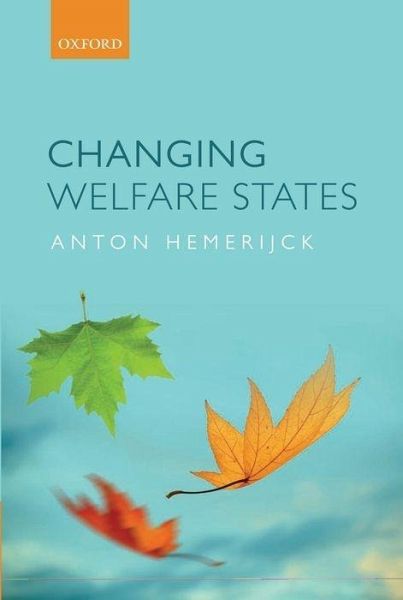
Changing Welfare States
Versandkostenfrei!
Versandfertig in 1-2 Wochen
174,99 €
inkl. MwSt.

PAYBACK Punkte
87 °P sammeln!
Changing Welfare States is a major new examination of the wave of social reform that has swept across Europe over the past two decades. In a comparative fashion, it analyses reform trajectories and political destinations in an era of rapid socioeconomic restructuring, including the critical impact of the global financial crisis on welfare state futures. The book argues that the overall scope of social reform across the member states of the European Unionvaries widely. In some cases welfare state change has been accompanied by deep social conflicts, while in other instances unpopular social ref...
Changing Welfare States is a major new examination of the wave of social reform that has swept across Europe over the past two decades. In a comparative fashion, it analyses reform trajectories and political destinations in an era of rapid socioeconomic restructuring, including the critical impact of the global financial crisis on welfare state futures. The book argues that the overall scope of social reform across the member states of the European Union
varies widely. In some cases welfare state change has been accompanied by deep social conflicts, while in other instances unpopular social reforms received broad consent from opposition parties, trade unions and employer organizations. The analysis reveals trajectories of welfare reform in many countries that
are more proactive and reconstructive than is often argued in academic research and the media. Alongside retrenchments, there have been deliberate attempts - often given impetus by intensified European (economic) integration - to rebuild social programs and institutions and thereby accommodate welfare policy repertoires to the new economic and social realities of the 21st century. Welfare state change is work in progress, leading to patchwork mixes of old and new policies and institutions, on
the lookout, perhaps, for greater coherence. Unsurprisingly, that search process remains incomplete, resulting from the institutionally bounded and contingent adaptation to the challenges of economic globalization, fiscal austerity, family and gender change, adverse demography, and changing political
cleavages.
varies widely. In some cases welfare state change has been accompanied by deep social conflicts, while in other instances unpopular social reforms received broad consent from opposition parties, trade unions and employer organizations. The analysis reveals trajectories of welfare reform in many countries that
are more proactive and reconstructive than is often argued in academic research and the media. Alongside retrenchments, there have been deliberate attempts - often given impetus by intensified European (economic) integration - to rebuild social programs and institutions and thereby accommodate welfare policy repertoires to the new economic and social realities of the 21st century. Welfare state change is work in progress, leading to patchwork mixes of old and new policies and institutions, on
the lookout, perhaps, for greater coherence. Unsurprisingly, that search process remains incomplete, resulting from the institutionally bounded and contingent adaptation to the challenges of economic globalization, fiscal austerity, family and gender change, adverse demography, and changing political
cleavages.














